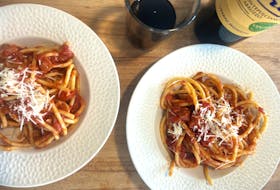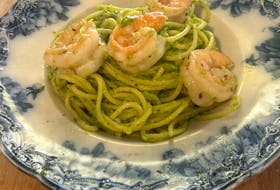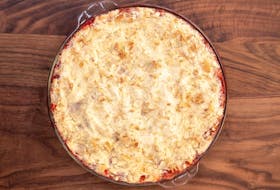Our cookbook of the week is The Pastry School by Julie Jones. Over the next two days, we’ll feature another recipe from the book and an interview with the author.
To try another recipe from the book, check out: Tartiflette pies .
Julie Jones ’s tartes fine (“thin tarts”) are the perfect showcase for sweet and juicy in-season pears. She sets off the lightly poached fruit with toasted walnuts and floral blue cheese for a dish that’s fun to assemble, elegant to look at and just as enjoyable to eat.
Regalis , a sheep’s milk cheese from the French region of Midi-Pyrénées, is Jones’s choice. But if you can’t find it, she says Roquefort would make a fine substitute (I used Moutonnière Blue , a sheep’s milk cheese from Fromagerie de la Moutonnière in Sainte-Hélène-de-Chester, Que.).
In France, a tarte fine typically consists of a flat round of puff pastry (with no raised edges), topped with a minimal amount of fruit to maintain its low profile. Jones riffs on the format in another savoury, fall-appropriate version in The Pastry School (celeriac and apple), and offers several pastry options for the base.
While she developed this recipe using her salted gluten-free pastry (recipe is in the book), hot water (recipe follows), inverted puff or sheet pastry work equally well. For a more experimental bake, Jones recommends trying choux, puff, salted shortcrust or viennoiserie pastry (recipes are all in the book).
WALNUT, PEAR AND REGALIS TARTES FINE
1 quantity Hot Water pastry (recipe follows)
Cornstarch, for dusting
For the pear:
100 mL (1/3 cup plus 1 tbsp) pear cordial, diluted with 100 mL water, or 200 mL (7/8 cup) water
50 g (1/4 cup) superfine sugar
Juice of 1 lemon
1 firm pear, washed
For the topping:
150 g (5 1/2 oz) Regalis (or Roquefort), crumbled into small pieces
80 g (2 3/4 oz) walnuts, toasted and crushed
1 punnet blackberries, halved
Interesting salad leaves, such as tagete, pea shoots and purple radish
To finish:
Extra-virgin olive oil, for drizzling
Runny honey, for drizzling
Maldon salt and black pepper
Rocket flowers, if in season (optional)
Step 1
Make the pastry following the recipe. Roll between two sheets of parchment paper to around 5 mm (1/4 in) thick; if it’s sticking, dust with cornstarch. Leave to rest in the fridge for at least 30 minutes.
Step 2
Preheat the oven to 180°C (350°F), Gas Mark 4. Line a baking sheet with parchment paper. Cut the pastry into six squares, each measuring approximately 10 x 10 cm (4 x 4 in). Place on the lined baking sheet. Prick the surface of each square with a fork, then score a border 1 cm (1/2 in) on each. There’s no need to egg wash the pastry, simply bake in the oven for 15–20 minutes, until golden and crisp. Remove from the oven and allow to cool on a wire rack.
Step 3
As the pear will brown quickly, gather all of the other ingredients first and have them ready for assembling. Mix together the cordial, water, sugar and lemon juice in a pan, then gently heat until just starting to simmer. Finely slice the pear vertically, either by hand or use a mandolin, then submerge the slices in the simmering liquid for 2–3 minutes, until pliable but not breaking. Drain and set to one side.
Step 4
Divide all of the topping ingredients evenly among the baked pastry squares, and fold and nestle a pear slice between the leaves. Drizzle with olive oil and honey then finish with a flourish of salt and pepper and some rocket flowers, if you like. Serve immediately.
Makes: 6 tarts
HOT WATER PASTRY
450 g (Scant 3 1/2 cups) all-purpose flour, plus extra for dusting
1 1/2 tsp fine salt
1 egg
175 mL (3/4 cup) cold water
100 g (1/2 cup minus 1 tbsp) unsalted butter, cut into 1 cm (1/2 in) cubes, no need to be precise
75 g (1/3 cup) lard, cut into 1 cm (1/2 in) cubes, no need to be precise (see note)
Step 1
Place the flour and salt in a large bowl and briefly mix to combine. Make a well in the centre of the flour, crack in the egg and mix through with a fork. Gently heat the water, butter and lard in a small saucepan until the fats have melted. Increase the heat and allow the water to boil for 20 seconds or so, then remove from the heat.
Step 2
Using a slow yet steady stream, pour the liquid into the flour, mixing with a spatula or wooden spoon to form a thick paste. Give the paste a quick but vigorous mix, then cover the bowl with a damp cloth and leave to rest at room temperature for 1 hour.
Step 3
Turn out onto a lightly floured work surface and knead with your hands for about 30 seconds, until the dough looks smoother, paler and more pastry like. Wrap in cling film and place in the fridge for a minimum of 30 minutes, preferably no longer than 1 hour.
Step 4
Roll out onto a lightly floured surface to a depth of 3–5 mm (1/8–1/4 in), depending on what you are using it for and use according to the relevant recipe instructions.
Makes: 1 quantity
Note: For a vegetarian option, omit the lard and use just 175 g (3/4 cup) butter instead.
Excerpted from The Pastry School by Julie Jones. Text copyright 2020 © Julie Jones. First published in Great Britain in 2020 by Kyle Books, an imprint of Kyle Cathie Ltd. Reproduced by arrangement with the publisher. All rights reserved.
Copyright Postmedia Network Inc., 2020








